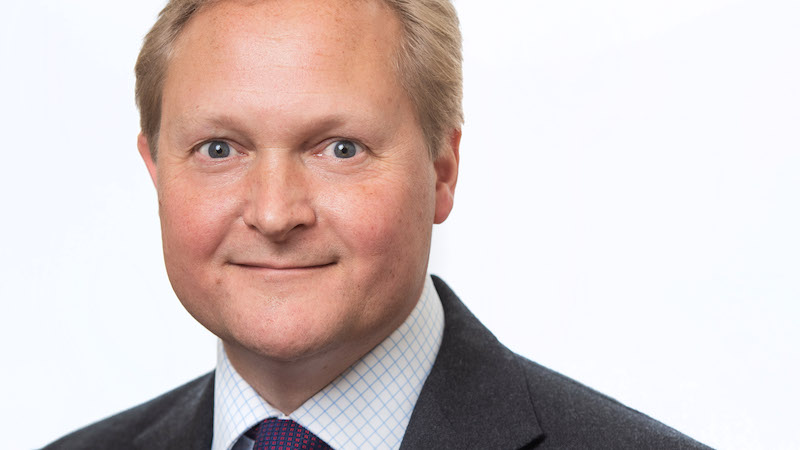The Securities Trust of Scotland has tasked Troy Asset Management with building up assets in the £234.7m investment trust as it yanks the mandate from Martin Currie following the exit of its global equity income team.
James Harries (pictured) will take over management of the portfolio from October 2020 with support from Tomasz Boniek and the wider Troy team. The Securities Trust of Scotland board handed Martin Currie notice on 3 June, a day after the departure of manager Mark Whitehead and the global income team was revealed. Sanlam has since announced it has nabbed the team for a £200m global income fund launch.
Martin Currie is now left with just one investment trust in its stable, the £282.1m Martin Currie Global Portfolio Trust, managed by Zehrid Osmani. A year ago the Martin Currie Asia Unconstrained investment trust was wound up after poor performance.
Securities Trust of Scotland shares were up 4.6% at midday Thursday and Investec has initiated a buy rating on the investment trust. “The new manager can demonstrate a proven philosophy and impressive track record, and we also note that Troy has been successful in growing shareholders’ funds of Personal Assets Trust from £149m to £1.3bn, and Troy Income & Growth from £47m to £253m,” said Alan Brierley and Ben Newell in an analyst note.
Troy will now offer three investment trusts. Chief investment officer Sebastian Lyons said the appointment “presents us with the opportunity to build upon our existing track record of managing investment trusts”.
See also: Securities Trust of Scotland manager resurfaces at Sanlam with global income team
Will Securities Trust of Scotland assets follow in the same footsteps as other Troy investment trusts?
AJ Bell head of active portfolios Ryan Hughes said there was no reason Harries wouldn’t replicate the asset growth his colleagues Sebastian Lyon, Francis Brooke and Hugo Ure have achieved on their respective investment trusts.
Hughes noted the tiered fee structure that will be introduced under Troy’s management also points to the firm’s growth ambitions. Troy will receive an annual management fee of 0.65% of net assets up to £750m, then 0.55% on assets up to £1bn and 0.50% on assets above £1bn. For the first year, Troy will take no management fee.
Those thresholds are well above the existing net assets of £234.7m. “The trust has scale but it’s a long way off that £750m level,” Hughes said.
He added that Harries had struggled to gain much traction with the Troy Global Income fund, which launched in 2016, until this year “when people started to notice its really strong performance”. “Now he’s got a bit of momentum with the open-ended fund and he’s got this trust as well.”
Investec said Whitehead had delivered solid performance but that asset growth had been unimpressive. When Whitehead took on the Securities Trust of Scotland in May 2016 assets were £177.4m and stood at £217.9m four years later just ahead of news of his departure, according to the Association of Investment Companies.
An alternative to Nick Clay’s new RWC fund?
Hughes said there was a “limited supply of good quality global equity income investment trusts”. The £1.5bn Murray International investment, managed by Aberdeen Standard Investments, and Baillie Gifford’s £760.3m Scottish American investment trust, which only holds 30% in North American stocks despite its name, are the largest portfolios in the six-strong AIC Global Equity Income sector.
Willis Owen head of personal investing Adrian Lowcock noted the JP Morgan Global Growth & Income is another attractive pick due to its strong dividend growth over the past five years.
AJ Bell already holds Harries’ Troy Global Income fund but would be open to investing in the investment trust, said Hughes. “The way that Troy operates is that the trusts are very similar to the open-ended funds so my expectation would be that James would run it in an almost identical way to his fund.”
Just yesterday, RWC announced it was launching the Global Equity Income fund for Nick Clay, who worked with Harries at BNY Mellon Investment Management on what was then known as the Newton Global Income fund.
Hughes said Securities Trust of Scotland could now also be a rival for Clay’s new fund, although he noted Harries had shifted away from the strict yield threshold he had employed at BNY Mellon IM once he joined Troy.
Lowcock noted the current Securities Trust of Scotland portfolio has greater exposure to telcos and technology than Troy Global Income, which has more exposure to consumer defensives and healthcare. “I would expect to see the trust become more defensive under Harries, I don’t think Troy will abandon their principles so expect the capital preservation to continue albeit with a greater growth focus than the fund.”
He thought Clay’s fund was more likely to compete with Troy Global Income but nevertheless added that the trust gives investors a third choice in accessing exposure to this area of the market. “Whilst both have similar pasts they will each have their own fans as well.”
See also: BNY Mellon fund faces more disruption as RWC touts near identical mandate for Nick Clay launch










